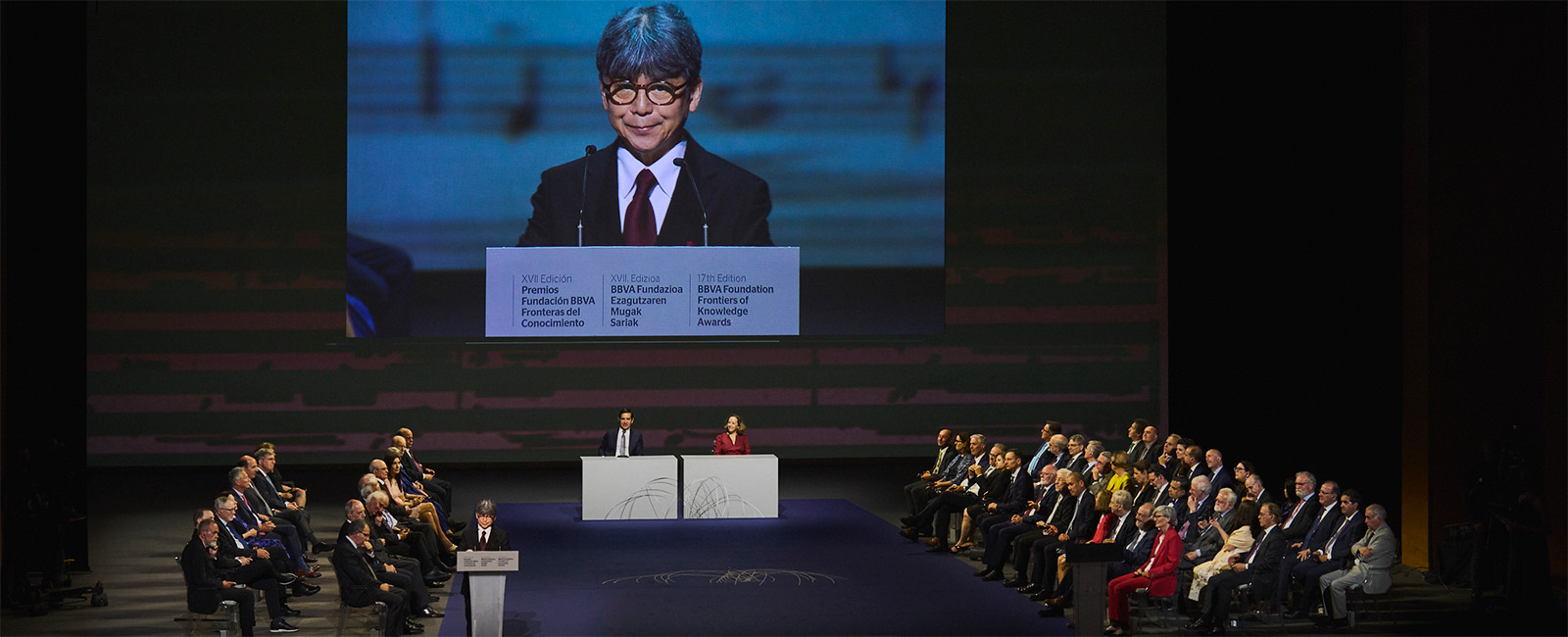
All the acceptance speeches of the laureates in the 17th Frontiers of Knowledge Awards
The ceremony of the 17th edition of the Frontiers of Knowledge Awards, held on 19 June in the Euskalduna Conference Centre in Bilbao, recognized 20 global leaders in scientific research and artistic creation. On this site we present the videos of the acceptance speeches of all laureates. Furthermore, in the web profile of each laureate in the 17th edition, acceptance speeches are available in both video and PDF text formats.
25 June, 2025
BASIC SCIENCES
Avelino Corma: “We have developed multifunctional catalysts able to perform cascade reactions, bringing us closer to the goal of an efficient, clean chemistry”
John Hartwig: “Catalysts are used to make organic molecules that change people’s lives. They have been used to make the molecules in drugs that treat cancer, HIV, hepatitis C, depression, and psoriasis”
Helmut Schwarz: “Performing experiments in the ‘smallest test tube in the world’ has indeed provided unprecedented microscopic insight into numerous chemical processes”
BIOLOGY AND BIOMEDICINE
Daniel Drucker: “There are an astounding number of new, more powerful GLP-1 medicines being developed, and exciting new indications that are being explored, including neuropsychiatric and neurodegenerative diseases and substance use disorders”
Joel Habener: “It is gratifying to see that my contributions to the discovery of GLP-1 are helping to alleviate illnesses in millions of people throughout the world”
Jens Holst: “In 2002 we could show that a 6-week-long subcutaneous infusion of GLP-1 to people with long-standing type diabetes had tremendous effects on blood glucose, insulin secretion and even body weight”
Svetlana Mojsov: “GLP-1 analogs represent a first example of a single medicine that is used to treat multiple disorders in human health, from diabetes to obesity, and has beneficial effects on the heart, kidney and possibly neurodegenerative diseases”
INFORMATION AND COMMUNICATION TECHNOLOGIES
Anil Jain: “With growing world disorder, security threats, financial fraud, and economic disparity, identifying human beings reliably will continue to require biometric recognition”
Michael Jordan: “The dialogue about AI needs to involve the general public in a way that speaks to their daily lives. It will not be able to contribute if the dialog continues to focus on the purported imminent arrival of a superintelligence that will somehow change everything. That is science fiction”
CLIMATE CHANGE AND ENVIRONMENTAL SCIENCES
Camille Parmesan: “Tackling the problems that have arisen because of human-driven climate change requires transboundary research, planning and action. Attacks on science, not only in the USA but around the world, are coming at a time of climate emergency when international cooperation is most needed”
ECONOMICS, FINANCE AND MANAGEMENT
Olivier Blanchard: “Traditionally, economists think of the labor market in terms of labor demand and labor supply, both depending on the real wage, and both firms and workers taking the real wage as given. I thought that, when thinking about aggregate wage determination, this did not capture reality”
Jordi Galí: “Much of my research has aimed at understanding the nature of fluctuations, as well as the role that monetary and fiscal policies can play in stabilizing them and limiting their harmful consequences”
Michael Woodford: “My own work has shown how the analysis of macroeconomic stabilization allows stabilization policy to be considered in an integrated way with the methods used in the field of public finance to analyze the microeconomic distortions associated with alternative tax policies”
HUMANITIES
Philip Kitcher: “The sciences and the humanities should be mutually complementary. Throughout my career I have sometimes reflected on scientific questions from the perspectives of philosophy, history, literature and the arts”
SOCIAL SCIENCES
Icek Ajzen: “My work has focused on the determinants of human action. It has led to the development of the theory of planned behavior, a theoretical framework that offers a clearly structured, testable model to explain why people behave the way they do”
Dolores Albarracín: “My work has clarified when messages affect not only attitudes, but also behaviors, and when beliefs mediate versus rationalize attitude change”
Mahzarin Banaji: “I can tell you that human attitudes and beliefs are clearly embedded in Large Language Models, often emerging from LLMs even more starkly than in humans”
Anthony Greenwald: “Research conducted with the Implicit Association Test and related methods brought the understanding of implicit bias to wide attention, and to use in fields well beyond psychology, including business, law, criminal justice, medicine, education, and political science”
Richard Petty: “Recognition for scientific work in psychology is critical if humanity is to continue to advance. For example, understanding how attitudes toward science itself are formed and changed is vital – because these attitudes can govern the decisions that world leaders make”
MUSIC AND OPERA
Toshio Hosokawa: “I believe that deep within the human heart lies a vast, endless ‘sea of sound’ that exists within everyone”

